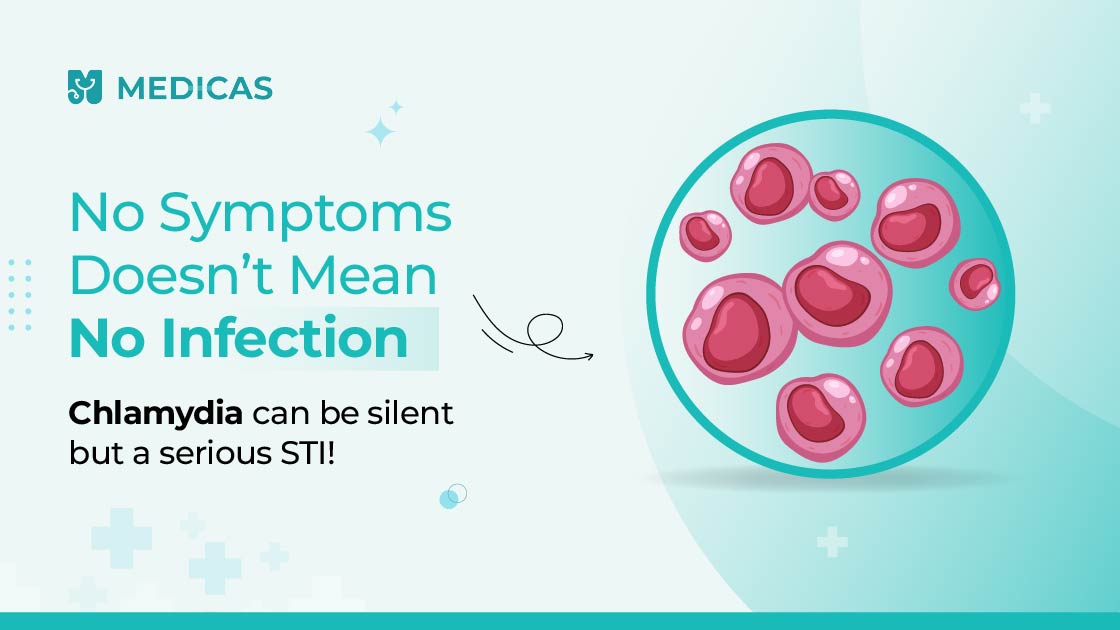Chlamydia is one of the most common sexually transmitted infections (STIs) in India, yet its silent nature means many people don’t realize they’re infected until complications arise. With an estimated 10-15% of sexually active young adults in India affected, according to public health surveys, awareness and early action are crucial. This blog draws on my experience as a doctor to demystify chlamydia, covering chlamydia symptoms, chlamydia treatment, chlamydia causes, and chlamydia testing. Whether you’re curious about chlamydia in men, chlamydia symptoms in females, or what happens if chlamydia is left untreated, this guide will provide clear, practical insights to protect your health. Let’s dive in and explore how to manage this infection effectively, with resources like booking a lab test or consulting a doctor online.
What Is Chlamydia?
Chlamydia is a bacterial infection caused by Chlamydia trachomatis, primarily spread through sexual contact. It can affect the reproductive organs, urethra, and even the eyes or throat in rare cases. In my practice, I often explain to patients that chlamydia is highly treatable, but its silent nature makes chlamydia testing essential for early detection. Understanding its basics sets the stage for recognizing signs of chlamydia in men and women and seeking timely care.
How Common Is Chlamydia?
Chlamydia is a global health concern, with millions of new cases annually. In India, urban and rural populations alike face high rates due to limited awareness and stigma around STI screening. Young adults aged 15-24 are particularly at risk, but chlamydia in men and women of all ages is common, especially among those with multiple sexual partners.
Causes and Risk Factors of Chlamydia
The chlamydia causes are straightforward: the Chlamydia trachomatis bacterium is transmitted through sexual activity. Risk factors include unprotected sex, multiple partners, or a history of STIs. In India, cultural taboos around discussing sexual health can delay chlamydia testing, increasing risk. Young women are particularly vulnerable due to biological factors like a less mature cervix.
How Does Chlamydia Spread?
Chlamydia spreads through vaginal, anal, or oral sex with an infected person. It can also pass from mother to baby during childbirth, potentially causing eye or lung infections in newborns. Understanding how chlamydia spreads underscores the importance of STI prevention through safe sex practices.
Symptoms of Chlamydia in Men and Women
Recognizing chlamydia symptoms can be challenging because up to 70% of cases are asymptomatic, earning it the nickname “silent STI.” When symptoms do appear, they differ between men and women, and knowing how do you know if you have chlamydia is key to early intervention.
Common Symptoms in Females
Chlamydia symptoms in females may include:
- Abnormal vaginal discharge with an unusual odor.
- Pain or burning during urination.
- Pelvic pain or discomfort during intercourse.
- Irregular menstrual bleeding. In my practice, women often dismiss these as minor issues, but they can signal chlamydia and warrant immediate attention.
Common Symptoms in Males
Signs of chlamydia in men include:
- Discharge from the penis, often white or cloudy.
- Burning or itching during urination.
- Testicular pain or swelling.
- Rectal discomfort if anal transmission occurred. Men may overlook these chlamydia symptoms, assuming they’ll resolve, but testing is crucial.
Silent Infections: When Chlamydia Has No Symptoms
Asymptomatic chlamydia is common, particularly in women, making regular chlamydia testing essential. Without symptoms, the infection can go undetected, increasing the risk of complications. If you’re sexually active, don’t wait for signs—book a lab test to stay proactive.
Complications If Left Untreated
What happens if chlamydia is left untreated? The consequences can be serious, affecting both reproductive and overall health. In my clinic, I’ve seen patients face avoidable complications due to delayed care, emphasizing the need for early chlamydia treatment.
Pelvic Inflammatory Disease and Infertility
In women, untreated chlamydia can lead to pelvic inflammatory disease (PID), a serious infection of the reproductive organs. PID can cause scarring of the fallopian tubes, increasing the risk of infertility or ectopic pregnancy. This is a key reason why chlamydia in women requires prompt attention.
Chlamydia and Pregnancy Risks
Chlamydia during pregnancy can lead to preterm delivery, low birth weight, or neonatal infections. I urge pregnant women with any chlamydia symptoms to seek immediate care, often through an online doctor consultation for quick access.
Chlamydia in Men: Long-Term Effects
For chlamydia in men, untreated infections can cause epididymitis, an inflammation of the tube carrying sperm, potentially leading to infertility. Chronic pain or prostate issues are also risks, highlighting the need for timely chlamydia testing.
Diagnosing Chlamydia
Diagnosing chlamydia is straightforward with the right tests, but it starts with knowing when to seek help. Chlamydia testing is a critical tool for early detection and effective management.
When Should You Get Tested?
Wondering how do you know if you have chlamydia? Get tested if you have chlamydia symptoms, a new sexual partner, or a history of unprotected sex. I recommend annual screening for sexually active individuals under 25 or those with multiple partners. Don’t delay—knowing when to see a doctor for chlamydia can prevent complications.
Types of Chlamydia Tests
Chlamydia testing typically involves a urine sample or a swab from the vagina, cervix, or urethra. In some cases, throat or rectal swabs are needed. These tests, available through lab testing services, are highly accurate and non-invasive.
Online Testing Options
How to get tested for chlamydia online? Many platforms offer at-home testing kits, where you collect a sample and send it to a lab. Results are reviewed by a doctor, often via an online doctor consultation, making it convenient for those hesitant to visit a clinic.
Chlamydia Treatment and Cure
Is chlamydia curable? Absolutely, with the right chlamydia treatment, most cases resolve completely. My goal is to help patients clear the infection and prevent recurrence.
Antibiotics Used for Treatment
Chlamydia treatment typically involves antibiotics like azithromycin (single dose) or doxycycline (7-day course). These are highly effective, but completing the full course is essential. Can chlamydia go away on its own? Rarely, and relying on this risks complications, so always seek medical care.
Importance of Partner Notification and Treatment
Treating partners is critical to prevent reinfection. I advise patients to inform recent sexual partners and encourage them to get tested and treated. This step is vital for breaking the cycle of chlamydia transmission.
Preventing Chlamydia
STI prevention is the best defense against chlamydia. Simple habits can significantly reduce your risk and protect your sexual health.
Safe Sex Practices
Using condoms consistently and correctly is one of the most effective ways to prevent chlamydia. Limiting sexual partners also reduces risk. I often discuss these strategies with patients to empower them in their sexual health choices.
Regular Screenings and Checkups
Routine chlamydia testing catches infections early, especially for asymptomatic cases. Schedule regular checkups or book an appointment to stay proactive, particularly if you’re at higher risk.
When to Book an Online Doctor’s Appointment
For those hesitant to visit a clinic, an online doctor consultation offers a private, convenient way to address chlamydia symptoms or concerns. Virtual care can guide you through testing and treatment with ease.
Myths and Facts About Chlamydia
Misconceptions about chlamydia can fuel stigma and delay care. Let’s clear up common myths with facts to help you make informed decisions about your health.
| Myth | Fact |
| Chlamydia only affects women. | Chlamydia in men is common, with signs of chlamydia in men like penile discharge or testicular pain. Both genders need chlamydia testing. |
| Chlamydia always has obvious symptoms. | Up to 70% of chlamydia cases are asymptomatic, especially in women, making regular chlamydia testing essential. |
| Chlamydia can go away on its own. | Can chlamydia go away on its own? Rarely, and untreated chlamydia can lead to what happens if chlamydia is left untreated, like infertility or PID. |
| You can get chlamydia from casual contact. | Chlamydia spreads through sexual contact or from mother to baby during childbirth, not through touching or sharing items. |
| Home remedies can cure chlamydia. | While home remedies can support health, chlamydia treatment requires antibiotics prescribed by a doctor. |
| Once treated, you can’t get chlamydia again. | Reinfection is possible if exposed again, so STI prevention and partner treatment are crucial. |
| Chlamydia tests are painful. | Modern chlamydia testing uses simple urine or swab tests, which are quick and minimally invasive. |
Understanding these truths helps you seek chlamydia treatment without fear or delay, protecting your health.
Conclusion
Chlamydia may feel like a daunting diagnosis, but it’s a highly treatable infection that doesn’t have to define your health. By recognizing chlamydia symptoms, understanding chlamydia causes, and prioritizing chlamydia testing, you can prevent what happens if chlamydia is left untreated. Whether you’re exploring chlamydia symptoms in females, signs of chlamydia in men, or wondering is chlamydia curable, resources like online doctor consultations and lab tests make care accessible. Take charge of your sexual health with confidence—early action and informed choices lead to better outcomes.
Frequently Asked Questions
- What are the symptoms of chlamydia in females and males? Chlamydia symptoms in females include abnormal discharge, pain during urination or sex, and pelvic pain. Signs of chlamydia in men include penile discharge, burning urination, and testicular pain. Many cases are asymptomatic, so testing is key.
- Can I get treated for chlamydia through an online doctor consultation? Yes, online doctor consultations can provide prescriptions for chlamydia treatment after assessing symptoms or test results. Visit this link for care.
- How accurate are online chlamydia tests? Online chlamydia tests are highly accurate when processed by certified labs. At-home kits, available through lab testing services, offer reliable results with professional follow-up.
- How do I book a doctor’s appointment online for an STI checkup? Schedule a virtual appointment via this link to discuss chlamydia testing or symptoms confidentially.
Disclaimer
Medical Advice: The information provided in this blog post is for educational purposes only and should not be considered as a substitute for professional medical advice, diagnosis, or treatment. Always consult with a qualified healthcare professional for personalized guidance regarding your specific medical condition.
Accuracy of Information: While we strive to provide accurate and up-to-date information, the field of medicine and viral fevers is constantly evolving. The content in this blog post may not reflect the most current research or medical guidelines. Therefore, it is advisable to cross-check any information provided with reliable sources or consult a healthcare professional.
Individual Variations: The symptoms, causes, treatment options, and preventive measures discussed in this blog post are general in nature and may not apply to everyone. It is important to remember that each individual’s situation is unique, and personalized medical advice should be sought when making healthcare decisions.
External Links: This blog post may contain links to external websites or resources for additional information. However, we do not endorse or have control over the content of these third-party websites. Accessing these links is done at your own risk, and we are not responsible for any consequences or damages that may arise from visiting these external sources.
Results May Vary: The effectiveness of treatment options or preventive measures mentioned in this blog post may vary from person to person. What works for one individual may not work the same way for another. It is essential to consult with a healthcare professional for personalized advice tailored to your specific needs.



